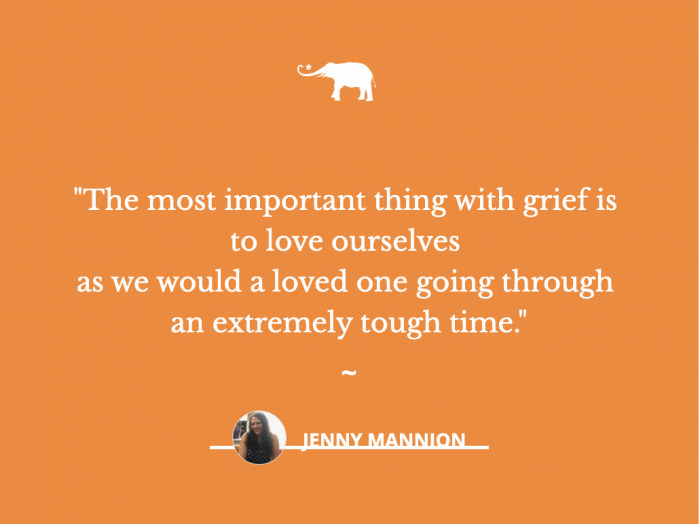View this post on Instagram
~
I taught tools on how to live our best lives for over a decade but was not prepared for the devastating effect the loss of my mom would have on me.
I had experienced grief before, but this was another level.
My mom was the first person I spoke to every day for over 50 years. She was more than my mother; she also happened to be my best friend.
She taught me about unconditional love, how to cook Italian food, nurtured my love of dance and writing as those were loves of hers too, and could make me laugh every single time we spoke no matter what kind of mood I showed up in.
I did not know how I could recover from my time being my mom’s sole caregiver as I watched her health decline and her ultimate passing. But I also knew as a mom myself, curling up for years in bed (as I felt I wanted to) would not be where my mom would want me.
I did not know how deeply I could feel grief or how those huge waves would leave me wondering if I would sink or swim.
Since surviving for myself, my kids, my family, and my loved ones was what I knew that, somewhere in my heart, I wanted, I had to find ways to keep moving forward.
I had some tools from studying and teaching personal development for 15 years to apply to try and make it through. I also had to find whole new ways of being and new tools to be able to live and transform.
These are some of the ways that helped me find myself stronger, wiser, and resilient:
1. Asking for help
As a healing practitioner, I know the value of this.
Since my teen years, I have always had some kind of counselor, coach, or mentor in my life. When hospice called to ask if I needed grief counseling, I hesitated but agreed. My grief counselor and the support group I participated in showed me new ways to think about and process grief.
I also have a close friend who showed up in ways I am so deeply grateful for—checking on me, sending meals and flowers, grief books, and just letting me know they were there if I needed them and were holding space for me. Sometimes I did allow myself to reach out even when I didn’t feel like it for that connection and love
2. Remembering love
I had to deeply understand I was hurting so badly because I loved my mom so much and our connection was so deep. Diving into the gratitude of the fact that I did have this love in my life for 50 years when many people have not—put it in a new perspective.
3. Knowing grief isn’t linear
Graduating with a bachelor’s degree in psychology, I had studied grief and the five stages described by Dr. Kubler-Ross—denial, bargaining, anger, depression, and acceptance—but I didn’t know it was possible to feel each so deeply each and every day, or that it would jump from one to the other. I could feel all that and more in even a few minutes, making me feel far from sane sometimes.
Allowing myself to honor these emotions and process them was key.
4. Learning from experts
The grief counseling was wonderful, but when grief dreams kicked in and I was waking up hysterical crying feeling as I had just lost my mom all over again, I knew I needed more help.
I met my shamanic teacher, who had survived her own grief after losing her son. She had written a book about living with grief and had a course about processing grief through shamanic methods and the medicine wheel. These methods truly helped me heal on such a deep energetic level.
5. Extra kindness to myself
I lost my best friend and mom in one.
Things shifted for me about a year to the day after my mom’s passing when I said to myself, “I am so sorry you lost your mom, Jen.”
When we say that to someone else, we feel loving-kindness and a deep sense of connection. When I said that to myself, “Boy, I bawled my eyes out” for about an hour, after that, something had released.
I allowed myself that unconditional love, comfort, support, and empathy I would a close loved one and that my mom would have given me.
6. Learning how to be that love for myself
My mom was such an amazing listener, advice giver, cheerleader, and any little bit of news you gave her, she saw the bright side and could make me laugh. I had to somehow be that for myself.
It took diving into extra deep self-care—like allowing myself to be in bed if I needed it and asking myself what I needed on a daily basis.
7. Meditation
My mom was the first person I spoke to every morning as we both were up around five a.m. and that brought in laughter, peace, centering, and me ready to begin the day.
I needed to fill that space and a mantra and sutra-based meditation practice was put into place. I had been trying to get a regular meditation practice in place for over a decade but it wasn’t until I knew I truly needed it that it stuck. I have not missed a day of at least half an hour, often one to two hours of meditation each morning in over eight months.
It brings me the peace, love, and centeredness that speaking with her used to bring me. Though, boy, I miss the laughing too.
There is no way to replace my mom or to totally heal from grief. A loving relationship being gone is not something we can “get over.”
We can choose to continue on with living instead of allowing ourselves to die along with that person. We can choose to cherish that love and to transform, adjust and invite in a new way of being.
Our loved ones would want the best for us and for us to be happy. The people in our world now deserve us to be present and happy.
Grieving is an ongoing process. Sometimes we will feel we have made it to a certain point and another wave will come out of seemingly nowhere.
The most important thing with grief is to love ourselves as we would a loved one going through an extremely tough time.
Patience, love, boundaries, and an extra dose of self-care are needed.
Reach out if you need others. Grief is not an easy thing to speak about, but almost all of us have been through it. It is much easier going through it with support.
I am still missing my mom like crazy but am able to move forward and find joy once again in life.
~












Read 8 comments and reply